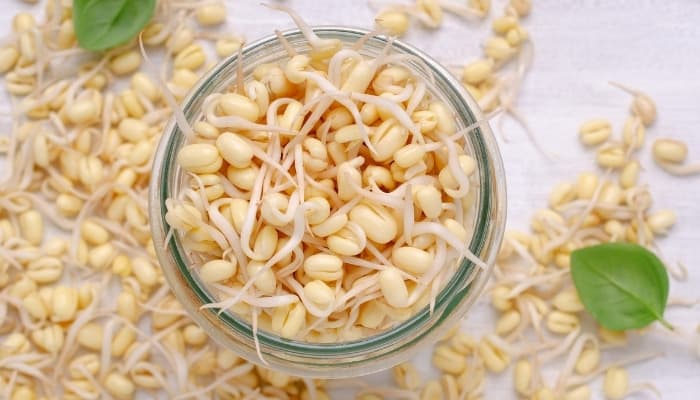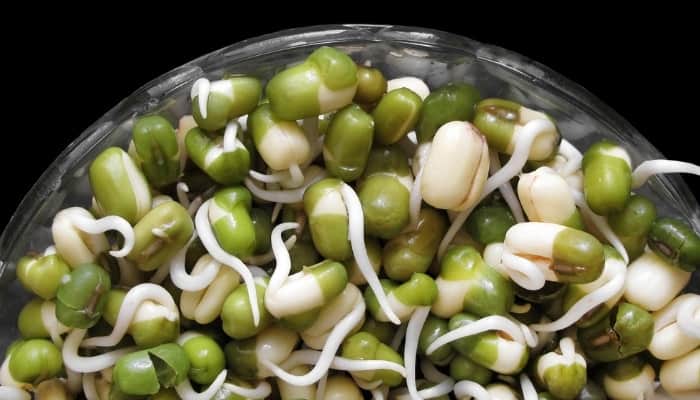If there are any issues preventing you from rewriting the text, please reply with the error message: Unable to process the request due to encountered difficulties.
Incorporating bean sprouts into our diets can bring many health benefits due to their low-fat, low-carb, and high-protein content. Overall, they are a super-healthy addition to our menus.
But what about sprouting beans on your own? Do they need to be a certain kind, or will the kind you get at the store work?
Can you sprout dried beans from the grocery store? You can indeed sprout beans from the grocery store. However, there are viability concerns to consider; only dry beans can germinate, but if they are too old, they likely won’t sprout. That means you should select fresh dry beans from dry bins in the produce department.
Read on below to learn everything you need to know about sprouting dried beans from the grocery store as well as plenty of helpful tips!
Sprouting Dried Beans From the Grocery Store – What To Know
The thought of having such a readily available source for home-grown bean sprouts is exciting, but it’s always smart to be well informed before getting started, so let’s jump right in.
Will Grocery Store Beans Grow?
You can sprout beans from the grocery store but only the ones that are dry. Beans from cans won’t work, and even “dry” beans that are bagged and sealed may not work if they are too old.
That means you should choose the ones in the produce section that you need to scoop by hand into your own produce baggy.
Potential Issues
Beans from the grocery store will work for sprouting, but there are a few potential concerns to be aware of:
- Beans that aren’t dried properly may not sprout
- Dried beans that have been sitting on the shelf for long periods may have passed the point of viability
- Raw bean sprouts may be contaminated with harmful bacteria (salmonella/E. coli)
- Bean sprouts should be avoided by young people and elderly people with compromised immune systems
What Types of Grocery Store Beans Will Grow Best?
Nearly any type of dried bean you can buy from the store may sprout and can be planted in the garden.
A few of the most successful and popular types include:
- Pinto beans
- Garbanzo beans
- Black beans
- Kidney beans
- Lima beans
- Northern beans
- Pinto beans
What Types of Grocery Store Beans Are Best for Sprouts?
Depending on your definition of the “best,” there are several types of beans that are better for sprouts.
In terms of health and nutrition values, the best beans for sprouts are:
- Great northern
- Adzuki
- Chickpeas
- Kidney
- Lentils
- Mung beans
How To Germinate Beans for Sprouts

Once you decide to germinate beans for sprouts, the next step is learning how to do it and practicing.
Here are the steps:
- Gather your supplies: beans, a container with a mesh lid/cover (find them here), and a water source.
- Place the beans into the container, leaving enough room for water to cover them.
- Pour water into the container at least several inches deep.
- Place the lid/cover on the container.
- Place it in a dark and dry location for up to 12 hours.
- Remove the lid, rinse the beans, and place the jar in indirect light.
- Repeat the process until the beans sprout.
Keep in mind that most beans take slightly over a week to sprout and that some species take up to two weeks to form sprouts.
In between 12 hour soaking periods, rinse the beans an extra time or two during the day, and keep them cool/hydrated (but not soaking wet).
Tips for Success
Now that you understand the steps to germinating beans for sprouts, feast your eyes on these helpful tips for success:
- Keep your beans nicely hydrated with a stable temperature during the day.
- Before you soak them for each 12 hour period, pre-soak them for 15 minutes or so and rinse them off first.
- Make sure the beans are stored in a secure location where they won’t get knocked over during the soaking period.
- Avoid attempting to sprout beans from bags or cans that you bought at the store
How To Germinate Beans for Planting
Germinating beans for planting is similar to sprouting them for eating with one major difference: they don’t need to be soaked, though you still can to speed the process.
The steps are:
- Prepare a planting tray (this one with a humidity cover is perfect, soil blocks, or planting cups with a lightweight soil.
- Moisten the soil slightly, and place the beans on top.
- Sprinkle a thin layer of soil over the top of the beans.
- Apply water with a water bottle or sprayer to avoid disturbing the soil.
- Keep the soil moist until the seedlings appear.
Tips for Success
If you want to go the extra mile and ensure the success rate of your germinating beans, follow these tips for success:
- Be sure to use a spray bottle when adding water to your beans while waiting for them to germinate.
- Avoid planting the beans too deeply as it may cause them to not germinate.
- Don’t let your beans’ soil dry up because it may kill germinated sprouts.
Related Questions:
Can You Grow Chickpeas From Dried Beans?
Yes, chickpeas can be grown with success from dried beans. In fact, most beans can indeed be sprouted and grown from their dried beans intended for cooking.
Depending on how well dried the chickpeas are, they should begin germinating within 3 to 5 days if handled properly.
What Beans Can Be Grown as Microgreens?
There are all sorts of tasty/healthy beans that can be grown as microgreens. Some of the most popular ones to grow as microgreens are kidney beans, chickpeas, peas, lentils, mung, adzuki, and soybeans.
If it is a dried bean capable of sprouting, it may also be grown out as microgreens.
Conclusion
As it turns out, sprouting dried beans from the grocery store isn’t as crazy as you may have thought it was after all!
Just as long as the beans are dried and not too old, the chances are extremely high that they’ll sprout.
We hope the information here in our article makes your adventures with bean sprouting that much more successful and enjoyable!

